Learn together

Skills development is a fundamental element among Snam’s values, especially considering the context of continuous change and evolution in which the Group operates. Snam offers its people customised training courses based on their role and experience, in order to meet the training needs of each employee. Particular emphasis is placed on training on digitalisation issues, which are fundamental for meeting the technological challenges posed by the transformation of the Group’s reference context.
Wanting to enrich the heritage of technical know-how has led to the establishment of Competence Centres, i.e. groups of people across organisational structures who possess consolidated and recognised knowledge and experience in certain subject areas relevant to the business, with the main objective of overseeing, developing and disseminating corporate know-how and being an internal point of reference for the relevant knowledge. The Competence Centres are flanked by an “Internal Faculty” made up of 80 employees who transfer their technical and business knowledge to other colleagues in a “from Snam to Snam” logic.
Snam Institute, which completes the framework of the initiatives proposed by the Group, is an accelerator of innovation, capable of projecting the company into the future, starting from its roots, i.e. the technical know-how that characterises it, to make it the heritage of all through training courses developed in three thematic areas: Technical, Leadership, and Innovation & Transformation.
Training is a strategic priority in which Snam continuously invests in order to support the daily work of management, as well as that of the entire company population. In particular, with regard to managerial training, we highlight the “Leadership School” training course, which in 2020, involved all of the approximately 360 people managers with the goal of giving a more incisive push to the adoption of managerial attitudes and behaviours appropriate to the type of organisational development and managerial culture that Snam is pursuing. Participants were involved in 6 meetings during which they dealt with relevant topics such as unconscious bias and inclusive communication, team management and development, and promoting managerial courage.
Competence Centres
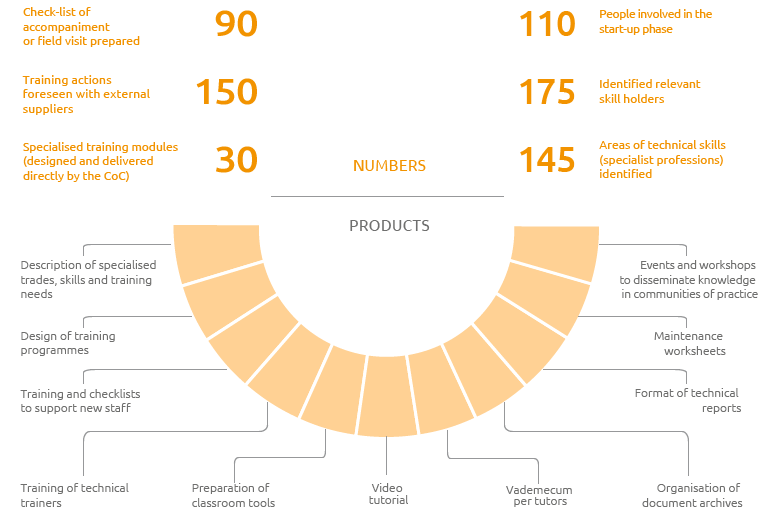
Snam Institute, the innovation accelerator
Snam Institute is a platform created with a view to opening up to the outside world, grasping the changes taking place in the constantly evolving context in which Snam operates, particularly in the areas linked to digitalisation and innovation, in order to evolve its management models and make use of all the new digital technologies available. The platform articulates its courses around three fundamental pillars: Technical, Leadership, Innovation & Transformation that offer opportunities to exchange and evolve the Group’s knowledge and managerial skills in order to develop the business. As part of Innovation & Transformation, Snam has introduced Digital Experience training courses linked by the concept of transformation and organised in three modules: Human, Innovation and Culture. The first one focuses on transformation as an opportunity for growth for people and society, the second one deals with the transformations taking place in the way of doing business enabled by new technologies and digital, and finally, the third package of courses focuses on the transformation of organisations and ways of working that unleash the innovative potential of people. Since June 2020, the platform has seen a revamped user interface, as well as the launch of 11 new courses, gamification and a test on digital knowledge.
The Covid emergency has dramatically accelerated the change in the way of working and training. Snam aims to innovate, not only to respond effectively to the challenges that have arisen, but to improve existing processes and be recognised as a forerunner in this field as well. In this regard, in 2020, the Innovative Learning project was launched, which will continue in 2021 with the aim of innovating training across the board, in line with changing business needs, encouraging the continuous development of technical and managerial knowledge, enhancing the Centres of Competence and Professional Families, through digitalisation and new technologies. In addition, the Snam Institute training catalogue has been enriched with 36 new e-learning courses and 48 courses delivered in Distance Learning, the new training method made necessary by the health emergency and which, in order not to lose the effectiveness of the training activities, has adapted the structure and duration of the courses, taking into account the drastic reduction in the average concentration time of people compared to training in a physical environment. During 2020, 66,385 hours of training were provided with 17,277 participants and 90% of the company population were involved (95% of women and 89% of men were involved in at least one training course), providing an average of 20.4 hours per employee. The decrease in training hours (-41.8% compared to 2019) is partly attributable to a reduction in compulsory training hours and partly to the need to redesign training to be delivered at a distance.
Average hours of training (no.)
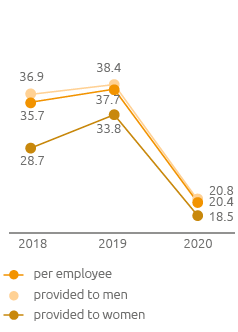
Attendances and engagement
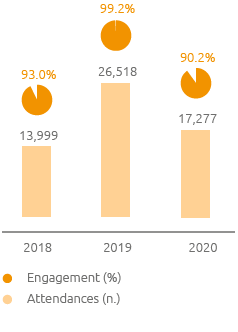
Key training initiatives
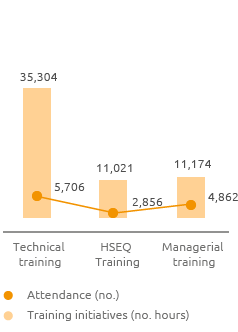
In addition, approximately 8,154 hours of training were provided, with 1,437 participants attending exclusively on health and safety, topics that are always central to Snam employee training and are part of the broader “Health, Safety, Environment and Quality (HSEQ) Training” area. To further strengthen its commitment in this field, Snam Institute has signed a collaboration agreement with the National Fire Brigade for the provision of training to technical personnel through courses on the safe management of gas infrastructures, fire prevention and other topics related to transport, storage and regasification activities.
Personnel Training hours
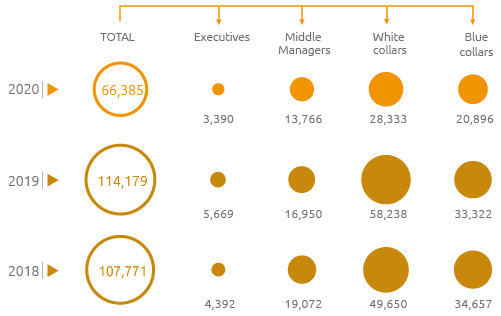
Snam for schools: external training activities
Snam Institute is not only dedicated to training employees and collaborators, but also stakeholders as a whole. With this in mind, in 2020, Snam continued its activities aimed at schools with the Young Energy project, now in its fourth year, which aims to facilitate orientation of students and bring them closer to the world of work through initiatives focused on the company’s business. The Young Energy format has been completely digitally redesigned, involving about 800 students from 8 technical institutes and continuing in the same way also in 2021, involving 8 new schools between technical institutes and high schools.
In 2020, the Con la scuola project also continued, carried out by Snam in collaboration with LUISS Business School and Consorzio Elis, which aims to strengthen the link between school and business, thus contributing to the renewal and evolution of the school as an organisation. A central element of the project is training for class councils, headmasters and teachers, providing them with new tools and methodologies to prepare students for the world of work effectively. The aim of the project is to help schools move from knowledge-based teaching to competence-based teaching, where cooperation, involvement and creativity are the essential ingredients of a new way of education.
In 2020:
- 40 institutions were involved (48% from the North, 27% from the Centre and 25% from the South);
- 45 class councils were held;
- 300 teachers and 1,000 students took part
- 20 webinars, 13 experiential workshops and 2 days of in-person training took place.
An approach strictly linked to meritocracy
At Snam, merit is the basis for professional development and career opportunities and, at the same time, is the benchmark for ensuring that people management meets criteria of fairness and sustainability. For Snam, the assessment of said criteria is fundamental in order to create a corporate culture where individuals are valued, taking into account their abilities and the contribution they can make to the pursuit of the Group’s objectives.
Performance Management is designed with this in mind, a process of assigning and assessing objectives linked to sustainability issues and behavioural aspects consistent with those defined in the corporate strategy to all the people who contribute to results on a daily basis, enabling them to grow together with the business. During 2020, the third cycle of Performance Management was launched with the aim of expanding the scope to the population of Technicians and Employees with the support of ad hoc training organised on the territory starting in February 2020 and ending in 2021.
| Download XLS (11 kB) |
|
Men |
Women |
Total |
|---|---|---|---|
Executives |
89 |
18 |
114 |
Middle Managers |
390 |
87 |
506 |
White collars |
744 |
259 |
986 |
Total |
1,223 |
364 |
1,606 |
In 2020, both the number of assessed staff and the number of sustainability targets assigned by the performance management programme are higher than in the previous year, +1.2% and +23.2% respectively. This increase is mainly due to the expansion of the activities to which they are linked (activities related to the hydrogen and biomethane businesses).
Performance Management involves a learning path consisting of 2 days of training and half a day of follow-up for each competence. In order to activate an assessment as extensive as possible on the company population through a structured and homogeneous framework, all job positions, with the exception of executives, are also subject to the analytical and comprehensive assessment of Complexity, Responsibility, Experience and Autonomy (C.R.E.A.) factors. In 2020, 320 CREA assessments were approved.
| Download XLS (11 kB) |
|
2018 |
2019 |
2020 |
|||
|---|---|---|---|---|---|---|
|
Assigned |
Reached |
Assigned |
Reached |
Assigned |
Reached |
Objectives Executives |
131 |
97 |
144 |
81 |
198 |
85 |
Objectives Middle Managers |
274 |
87 |
239 |
88 |
282 |
81 |
Objectives Other staff |
63 |
89 |
377 |
84 |
456 |
85 |
Total |
468 |
90 |
760 |
85 |
936 |
84 |
Snam considers meritocracy to be a fundamental value for guaranteeing an adequate remuneration system for its employees, which is periodically updated on the basis of comparisons with reference markets. In particular, these systems aim to ensure recognition of the results achieved, the quality of the professional contribution provided and individual development potential of the person.
In 2020, the Snam 2020 Remuneration Policy for Directors, Statutory Auditors and Key Executives was approved. The document defines the new long-term equity incentive plan 2020-2022, which provides for the assignment of ordinary shares of the Company against the achievement of performances measured over a period of three years.
In the new Remuneration Policy, sustainability becomes an even more relevant factor, both because the weighted accident frequency and severity index, the DJSI, FTSE4GOOD and CDP (formerly the Carbon Disclosure Project) indices, and the Forestation Project are taken into account, and because the weighting of sustainability objectives (ESG) in short-term and long-term variable incentives is increased from 10% to 20%, systems designed to reward top performance and young resources with development potential.
Lastly, Snam implemented a “Participation Bonus”, instituted by the National Collective Labour Agreement, based on the performance of profitability and productivity parameters, measured in relation to the targets agreed upon every year between the company and the trade-union representatives. The Snam Remuneration Policy for 2021 relating to Directors, Statutory Auditors and Executives with strategic responsibilities will be approved during the Shareholders’ Meeting on 28th April 2021.
Key Executives, other than Directors and Auditors, are as follows: Chief Energy Transition Officer; Chief Financial Officer & Chief International & Business Development Officer; Chief Industrial Assets Officer; General Counsel; Executive Vice President Human Resources & Organization & PFM.
Protection of workers’ rights: relations with trade unions
During 2020, Snam maintained constant relations with the trade unions at national and local level through 155 virtual meetings, in compliance with government regulations and specific company policies aimed at limiting contagion from Covid-19, during which the parties discussed various projects to develop already consolidated businesses and those recently launched, as well as issues of organisational importance arising from the crisis situation that occurred this year. Specifically, the issues addressed in the meetings concerned the definition of paths deriving from the integration of commercial dispatching with physical dispatching, aimed at optimising transportation and storage activities, and the scheduling of the work of the technical commission on the “SMART Gas” and “SMART Gas Impianti” projects, aimed at improving the effectiveness of technical and operational processes relating to asset maintenance activities.
In the regasification business, meetings were held with the trade unions, at national and local level, aimed at sharing and comparing the issues concerning the evolution of the business that can have an impact on employees.
In 2020, the total number of pending litigations is 16 (+3 compared to 2019), of which one is for termination pay litigation, four for breach of contract, ten for joint and several liability and one for professional development, while the number of litigations opened in the year is 11, down four from the previous year.
| Download XLS (11 kB) |
|
2018 |
2019 |
2020 |
||
|---|---|---|---|---|---|
Total disputes pending at 31.12 |
13 |
13 |
16 |
||
Opened in the reference year |
51(*) |
15 |
11 |
||
Closed in the reference year |
67 |
15 |
8 |
||
|
|||||